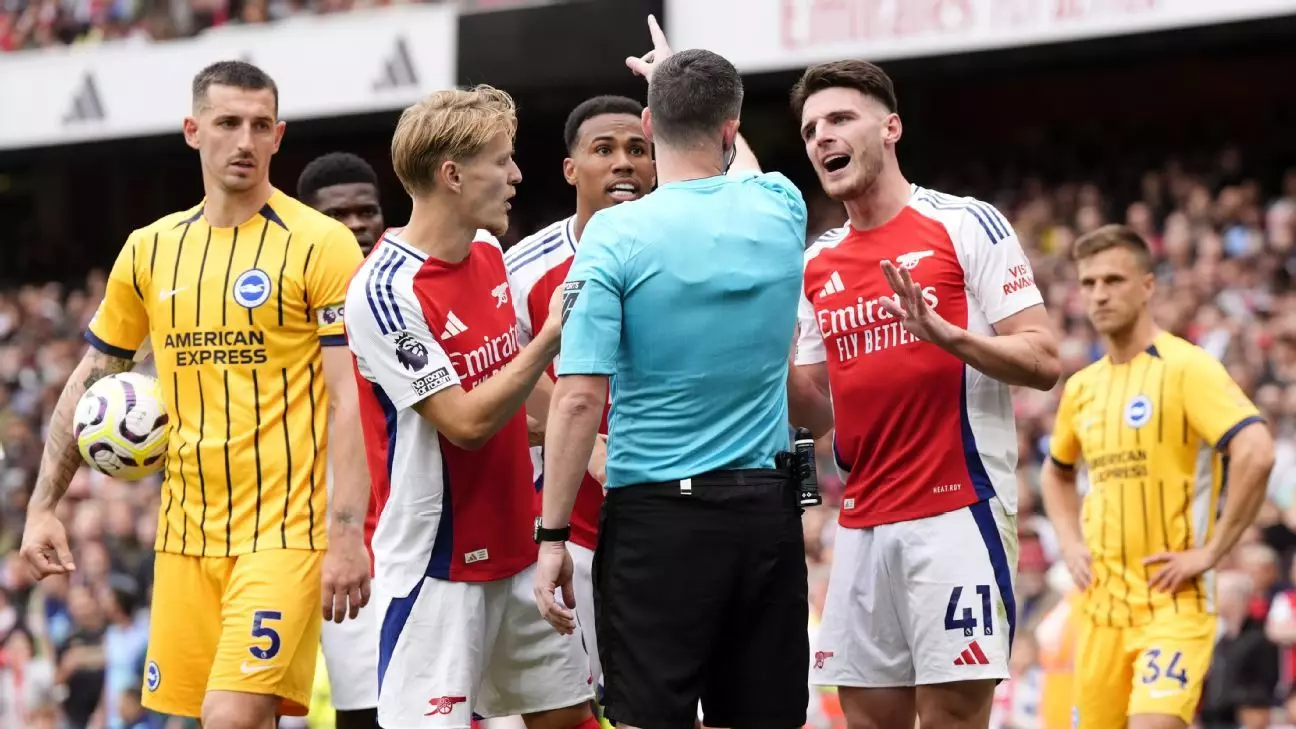In the fast-paced world of Premier League football, referees are often placed under immense pressure to make swift and accurate decisions. A recent incident involving Arsenal’s Declan Rice has sparked discussions about the nature of officiating and the inherent challenges referees face during games. The controversy surrounding Rice’s red card for delaying a free kick against Brighton has drawn attention to the rigid rules governing the sport, leading many, including match officials, to reflect on the challenging aspects of their roles.
During a match last month, Declan Rice, already on a yellow card, kicked the ball away in an attempt to delay the free kick that Brighton was about to take. Premier League referee Chris Kavanagh had little choice but to issue a second yellow card, resulting in Rice’s dismissal. In a candid moment captured in the recently aired “Match Officials Mic’d Up,” Kavanagh expressed his discomfort with the decision, acknowledging the rigidity of the rules while recognizing the player’s actions as detrimental to the flow of the game. This highlights a fundamental conundrum for officials: adherence to established rules versus the nuances of situational context.
Kavanagh’s sentiments resonate on multiple levels: on one hand, the intention of preventing players from manipulating the pace of the game is a valid one; on the other hand, the spontaneous nature of football often requires a more flexible approach to officiating which can take into consideration the context of the actions taken by players.
In response to the incident, Arsenal’s manager Mikel Arteta expressed his bafflement over Rice’s ejection, indicating that such a punishment seemed excessively harsh for what he deemed a minimal infraction. Arteta’s vocal criticism of the referee’s decision underscores a broader debate within football about the proportionality of penalties and the potential for stricter player-focused rules to inadvertently lead to disproportionate reactions to minor offenses.
This situation also raises questions about consistency in officiating. Arteta pointed out that Brighton’s Joao Pedro had similarly delayed a restart earlier in the match but escaped without any punishment. This inconsistency can lead to frustrations not only from managers but also from fans and players alike, who seek a fair application of rules across the board.
The introduction of VAR has often aimed to clarify controversial decisions, but incidents like the one involving Declan Rice suggest that it may have contributed to further complexity instead. Howard Webb, the chief of PGMOL, emphasized the need for clear communication when it comes to decision-making among officials. The contrasting decisions surrounding penalty incidents, including the overturned call against Everton’s Dominic Calvert-Lewin and the mishandling of Dango Ouattara’s borderline handball, illustrate the occasional shortcomings of the system designed to enhance fairness and correctness in officiating.
Refereeing in football is inherently subjective, which might sometimes lead to arbitrary distinctions being made on the field. Webb’s admission of mistakes shows that human error remains an unavoidable reality in officiating, despite technological advancements.
The controversy surrounding the Declan Rice incident serves as a reminder of the numerous challenges referees face in the Premier League. It raises critical questions about how best to balance the intent of rules with the spirit of the game. As players, managers, and fans navigate these turbulent waters, it becomes increasingly clear that the pursuit of clear, equitable officiating remains an ongoing endeavor, one that requires constant reflection, adaptation, and communication between all parties involved in the beautiful game. The complexity of decision-making processes in football ensures that this conversation will continue, challenging all stakeholders to remain engaged and responsive to the evolving dynamics of the sport.

